Urban Food Waste: A Framework to Analyse Policies and Initiatives
Abstract
:1. Introduction
2. Materials and Methods
3. Results
3.1. Assessing Food Waste Policies: The Main Categorisations and Themes
3.2. Investigating Leading Practices in Urban Food Waste Policies
3.3. Framework to Analyse Urban Food Waste Policies
- Food donations: enabled through voluntary agreements signed between public or private actors and third parties (e.g., NGOs, charities, local organisations);
- Education: wide range of awareness raising initiatives addressing and involving citizens, charities, NGOs, as well as private actors (e.g., retailers, restaurants) and public ones (e.g., municipalities, schools, hospitals). They aim to raise awareness about food waste, but also entail capacity building, training, activities in the schools, etc.
- Promoting short supply chains: initiatives and projects aimed at strengthening urban-rural linkages, to better connect local (e.g., peri-urban) producers with urban food consumers for instance by investing in food markets or farmers’ markets.
- Circular economy: broad range of initiatives aimed at transforming food waste into new products (e.g., bio-fertilizers, animal feeding and clean energy by public or private waste management companies).
- Digital tools: initiatives aimed at tackling food waste by harnessing the potential of digital tools (e.g., apps, platforms, websites, etc.)
- Fiscal incentives: initiatives aimed at incentivising a broad range of actors to reduce food waste for instance by cutting taxes for those private actors donating surplus food;
- Employment: initiatives aimed at tackling food waste by employing citizens usually coming from marginalised groups (e.g., long-term unemployed).
- Additionally, tackling food waste can be a key component of wider initiatives based on integrated management of the urban challenges and that promote the collaboration and coordination of the urban ecosystem.
3.4. Exploring the Multiple Nexus of Urban Food Waste Policies
- Via educational programmes and campaigns, i.e., by sharing information, in order to create awareness about food waste. In these cases, schools usually play a key role as educators, and often the students (i.e., the people who receive education on food waste) then contribute to dissemination activities (e.g., other hospitals in Bruges);
- Through food donations, when information on the available food supply (i.e., potential food waste) is exchanged between food suppliers (i.e., surplus of food, such as in food markets or supermarkets) and donors to prevent food waste;
- Through digital tools that can improve the information exchanged to raise awareness and prevent food waste, for example, customers can access information about lower-priced food that is close to expiry in a specific supermarket; and
- To promote circular economy initiatives, awareness-raising campaigns on the correct disposal of non-reusable food waste among citizens while informing them about how they can contribute to optimising the production of biogas that it is in turn reused in the city.
- Allow and define circular economy schemes. Food waste is used to create clean energy, biogas or biofuels for public transport (e.g., Linkoping and Malmo) or compost, which is used as an input in other production processes (e.g., peri-urban agriculture). The flows of food waste and derived products are agreed/activated through voluntary agreement and then formally regulated.
- Promote shorter food supply chains. The Municipality supports the food-related urban ecosystem through plans or strategies aimed at fostering cooperation among urban actors (e.g., caterers, hoteliers) and local farmers in order to create an efficient network/chain and promote an expansion of demand for local food from small-scale productions by citizens and institutions and to influence the food supply criteria.
- Support wider educational programmes. The City launches a broad specific plan or strategy with several goals, including the need to raise food waste awareness among citizens.
- Food donations. Food is donated to avoid waste (valorisation of food waste) thanks to voluntary agreements between actors;
- Circular economy mechanisms. The city signs an agreement with NGOs to use (potential) food waste as a mean to enhance urban production of food (e.g., compost used in urban gardens), which is then consumed (e.g., in public canteens); and
- Educational programmes. Local organisations sign an agreement with local authorities to raise awareness among citizens on food waste via training and campaigns.
3.5. Aligning Urban Food Waste Policies with the Relevant SDGs
4. Discussion
5. Conclusions
Supplementary Materials
Author Contributions
Funding
Acknowledgments
Conflicts of Interest
References
- FAO. Global Food Losses and Food Waste; FAO: Rome, Italy, 2011. [Google Scholar]
- Lipinski, B.; Hanson, C.; Waite, R.; Searchinger, T.; Lomax, J.; Kitinoja, L. Reducing Food Loss and Waste; WRI: Washington, DC, USA, 2013. [Google Scholar]
- Bellù, L.G. Food Losses and Waste: Issues and Policy Options; FAO: Rome, Italy, 2017; p. 18. [Google Scholar]
- World Bank GDP (Current US$) | Data. Available online: https://data.worldbank.org/indicator/ny.gdp.mktp.cd?end=2014&most_recent_value_desc=false&start=1960 (accessed on 29 June 2020).
- FAO. Food Wastage Footprint Full-Cost Accounting: Final Report; FAO-Food Wastage Footprint: Rome, Italy, 2014; ISBN 978-92-5-108512-7. [Google Scholar]
- IPCC. Climate Change and Land: An IPCC Special Report on Climate Change, Desertification, Land Degradation, Sustainable Land Management, Food Security, and Greenhouse Gas Fluxes in Terrestrial Ecosystems; IPCC: Geneva, Switzerland, 2019. [Google Scholar]
- FAO. Food Wastage Footprint: Impacts on Natural Resources: Summary Report; FAO: Rome, Italy, 2013; ISBN 978-92-5-107752-8. [Google Scholar]
- Kummu, M.; De Moel, H.; Porkka, M.; Siebert, S.; Varis, O.; Ward, P.J. Lost food, wasted resources: Global food supply chain losses and their impacts on freshwater, cropland, and fertiliser use. Sci. Total Environ. 2012, 438, 477–489. [Google Scholar] [CrossRef] [PubMed]
- Stenmarck, Å.; Jensen, C.; Quested, T.; Moates, G.; Buksti, M.; Cseh, B.; Juul, S.; Parry, A.; Politano, A.; Redlingshofer, B.; et al. Estimates of European Food Waste Levels; FAO: Rome, Italy, 2016; ISBN 978-91-88319-01-2. [Google Scholar]
- Campoy-Muñoz, P.; Cardenete, M.A.; Delgado, M.C. Economic impact assessment of food waste reduction on European countries through social accounting matrices. Resour. Conserv. Recycl. 2017, 122, 202–209. [Google Scholar] [CrossRef]
- Bos-Brouwers, H.; Burgos, S.; Colin, F.; Graf, V. Policy Recommendations to Improve Food Waste Prevention and Valorisation in the EU; Wageningen University: Wageningen, The Netherlands, 2020. [Google Scholar]
- Barilla Foundation. Food Waste: Causes, Impacts and Proposals; Barilla Center for Food and Nutrition: Parma, Italy, 2012. [Google Scholar]
- Scherhaufer, S.; Moates, G.; Hartikainen, H.; Waldron, K.; Obersteiner, G. Environmental impacts of food waste in Europe. Waste Manag. 2018, 77, 98–113. [Google Scholar] [CrossRef] [PubMed]
- Ellen MacArthur Foundation. Cities and Circular Economy for Food; Ellen MacArthur Foundation: Coase, UK, 2019. [Google Scholar]
- European Commission. EUR-Lex-52020DC0381-Communication from the Commission to the European Parliament, the Council, the European Economic and Social Committee and the Committee of the Regions-A Farm to Fork Strategy for a Fair, Healthy and Environmentally-Friendly Food System COM/2020/381 Final; European Commission: Brussels, Belgium, 2020. [Google Scholar]
- Artioli, F.; Acuto, M.; McArthur, J. The water-energy-food nexus: An integration agenda and implications for urban governance. Political Geogr. 2017, 61, 215–223. [Google Scholar] [CrossRef]
- Sonnino, R. The new geography of food security: Exploring the potential of urban food strategies. Geogr. J. 2016, 182, 190–200. [Google Scholar] [CrossRef]
- Filippini, R.; Mazzocchi, C.; Corsi, S. The contribution of Urban Food Policies toward food security in developing and developed countries: A network analysis approach. Sustain. Cities Soc. 2019, 47, 101506. [Google Scholar] [CrossRef]
- Rees, W.E. Why Place-Based Food Systems? Food Security in a Chaotic World. J. Agric. Food Syst. Community Dev. 2019, 9, 5–13. [Google Scholar] [CrossRef]
- Sonnino, R.; Marsden, T.; Moragues Faus, A. Relationalities and convergences in food security narratives: Towards a place based approach. Trans. Inst. Br. Geogr. 2016, 41, 477–489. [Google Scholar] [CrossRef]
- Dessì, A.; Kamel, L.; El Labban, S. Youth and the Mediterranean: Exploring New Approaches to Dialogue and Cooperation; Istituto Affari Internazionali: Rome, Italy, 2017; p. 146. [Google Scholar]
- Barilla Foundation. Cibo in Città. Guida Didattica Sulle Politiche Alimentari Urbane per le Persone e per il Pianeta; Barilla Foundation: Parma, Italy, 2020. [Google Scholar]
- C40 Cities; Arup; University of Leeds. Addressing Food-Related Consumption-Based Emissions in C40 Cities; C40: New York, NY, USA, 2019. [Google Scholar]
- ARC. More Responsible Food Consumption Proposals to Prevent and Avoid Food Wastage; Agencia de Residus de Catalunya: Catalunya, Spain, 2012. [Google Scholar]
- Zaman, A.; Lehmann, S. Urban Growth and Waste Management Optimization towards towards “zero waste city”. CityCult. Soc. 2011, 2, 177–187. [Google Scholar] [CrossRef]
- Kaza, S.; Yao, L.; Bhada, T.; Van Woerden, F. What a Waste 2.0: A Global Snapshot of Solid Waste Management to 2050; Urban Development Series; World Bank: Washington, DC, USA, 2018. [Google Scholar]
- Los Angeles Food Policy Council. Los Angeles Food System Snapshot 2013. A Baseline Report of the Los Angeles Regional Foodshed; City of Los Angeles Good Food Office: Los Angeles, CA, USA, 2013. [Google Scholar]
- Warshawsky, D.N. The devolution of urban food waste governance: Case study of food rescue in Los Angeles. Cities 2015, 49, 26–34. [Google Scholar] [CrossRef]
- FAO. Our World Is Urbanizing, Is Food on Your Agenda? FAO: Rome, Italy, 2018; p. 12. [Google Scholar]
- FAO. Five Ways to Make Cities Healthier and More Sustainable. Available online: http://www.fao.org/fao-stories/article/en/c/1260457/ (accessed on 30 June 2020).
- Dubbeling, M.; Bucatariu, C.; Santini, G.; Vogt, C.; Eisenbeiß, K. City Region Food Systems and Food Waste Management: Linking Urban and Rural Areas for Sustainable and Resilient Development; FAO: Rome, Italy, 2016; ISBN 978-92-5-109453-2. [Google Scholar]
- What Will We Eat Tomorrow? Download the E-Book! Rikolto. Available online: https://www.rikolto.org/en/what-will-we-eat-tomorrow (accessed on 30 June 2020).
- Giordano, T.; Ledant, C.; Di Martino, D.; Michel, C.; Roiatti, F. The Role of Cities in the Transformation of Food Systems: Sharing Lessons from MIlan Pact Cities; FAO: Rome, Italy, 2018. [Google Scholar]
- Magarini, A.; de Cunto, A.; Porreca, E. Food Losses and Waste in European Cities; Comune di Milano: Milano, Italy, 2018. [Google Scholar]
- SDSN. SDG Guide. Available online: https://sdg.guide/ (accessed on 30 June 2020).
- SDSN; Telos. The 2019 SDG Index and Dashboards Report for European Cities; Telos: Tilburg, The Netherlands, 2019. [Google Scholar]
- Cavalli, L.; Farnia, L. Per un’Italia Sostenibile: L’SDSN Italia SDGs City Index 2018; Fondazione Eni Enrico Mattei: Milano, Italy, 2019. [Google Scholar]
- Michelini, L.; Principato, L.; Iasevoli, G. Understanding Food Sharing Models to Tackle Sustainability Challenges. Ecol. Econ. 2018, 145, 205–217. [Google Scholar] [CrossRef]
- Cicatiello, C.; Franco, S.; Pancino, B.; Blasi, E. The value of food waste: An exploratory study on retailing. J. Retail. Consum. Serv. 2016, 30, 96–104. [Google Scholar] [CrossRef]
- Boschini, M.; Falasconi, L.; Giordano, C.; Franco, S.; Cicatiello, C.; Marangon, F.; Troiano, S. Preliminary results of a methodology for determining food waste in primary school canteens. FUP 2017, 72, 303–310. [Google Scholar] [CrossRef]
- Dansero, E.; Marino, D.; Mazzocchi, G.; Nicolarea, Y. Lo Spazio Delle Politiche Locali del Cibo: Temi, Esperienze e Prospettive; Rete delle Politiche Locali del Cibo: Rome, Italy, 2019. [Google Scholar]
- Giordano, C.; Falasconi, L.; Boschini, M.; Segrè, A. Detecting Drivers of Household Food Waste in Italy: Methodological Assessment of a Diary Study. In Proceedings of the SIDEA 2016 Conference, Bolzano, Italy, 22–24 September 2016; p. 11. [Google Scholar]
- Fattibene, D. From farm to land fill: How Rome tackles its food waste. In Collection Monografias Cidob; Istituto Affari Internazionali (IAI): Rome, Italy, 2018. [Google Scholar]
- RUAF. RUAF Urban Agriculture and Food Systems; RUAF: The Hague, The Netherlands, 2019. [Google Scholar]
- Sonnino, R. The cultural dynamics of urban food governance. CityCult. Soc. 2019, 16, 12–17. [Google Scholar] [CrossRef]
- Steel, C. Hungry City: How Food Shapes Our Lives; Chatto & Windus: London, UK, 2008; ISBN 978-0-7011-8037-9. [Google Scholar]
- Sonnino, R.; Tegoni, C.L.S.; De Cunto, A. The challenge of systemic food change: Insights from cities. Cities 2019, 85, 110–116. [Google Scholar] [CrossRef]
- Fattibene, D.; Maci, G.; Santini, G. Feeding Cities Putting Food on the Urban Planning Agenda; ETTG: Brussels, Belgium, 2019. [Google Scholar]
- Recanati, F.; Maughan, C.; Pedrotti, M.; Dembska, K.; Antonelli, M. Assessing the role of CAP for more sustainable and healthier food systems in Europe: A literature review. Sci. Total Environ. 2019, 653, 908–919. [Google Scholar] [CrossRef]
- Candel, J.J.L. Food security governance: A systematic literature review. Food Sec. 2014, 6, 585–601. [Google Scholar] [CrossRef]
- Principato, L. Food Waste at Consumer Level: A Comprehensive Literature Review-Ludovica Principato-Google Libri; Springer: Berlin/Heidelberg, Germany, 2018; ISBN 978-3-319-78887-6. [Google Scholar]
- Ferrando, T.; Mansuy, J. The European action against food loss and waste: Co-regulation and collisions on the way to the sustainable development goals. Yearb. Eur. Law 2018, 37, 424–454. [Google Scholar] [CrossRef]
- Barilla Foundation. The EU Food Systems Time for Action: Building Sustainable and Healthy Food Systems in EU; Barilla Center for Foodand Nutrition: Parma, Italy, 2020. [Google Scholar]
- Cerciello, M.; Agovino, M.; Garofalo, A. Estimating urban food waste at the local level: Are good practices in food consumption persistent? Econ. Polit 2019, 36, 863–886. [Google Scholar] [CrossRef]
- United Nations. New Urban Agenda; United Nations: New York, NY, USA, 2017. [Google Scholar]
- European Union. Urban Agenda for the EU Pact of Amsterdam; European Union: Brussels, Belgium, 2016. [Google Scholar]
- Doernberg, A.; Horn, P.; Zasada, I.; Piorr, A. Urban food policies in German city regions: An overview of key players and policy instruments. Food Policy 2019, 89, 101782. [Google Scholar] [CrossRef]
- Thyberg, K.; Tonjes, D. Drivers of food wastage and their implications for sustainable policy development. Technol. Soc. Fac. Publ. 2016. [Google Scholar] [CrossRef]
- Reisch, L.; Eberle, U.; Lorek, S. Sustainable food consumption: An overview of contemporary issues and policies. Sustain. Sci. Pract. Policy 2013, 9, 7–25. [Google Scholar] [CrossRef]
- BioIntelligence Service. Guidelines on the Preparation of Food Waste Prevention Programmes; European Commission DG ENV: Brussels, Belgium, 2011. [Google Scholar]
- Fattibene, D.; Bianchi, M. Fighting against food losses and waste: An EU agenda; Istituto Affari Internazionali: Rome, Italy, 2017. [Google Scholar]
- Flanagan, K.; Robertson, K.; Hanson, C. Reducing Food Loss and Waste: Setting a Global Action Agenda; Wold Resources Institute: Washington, DC, USA, 2019; ISBN 978-1-56973-964-8. [Google Scholar]
- Busetti, S. A theory-based evaluation of food waste policy: Evidence from Italy. Food Policy 2019, 88, 101749. [Google Scholar] [CrossRef]
- Joshi, P.; Visvanathan, C. Sustainable management practices of food waste in Asia: Technological and policy drivers. J. Environ. Manag. 2019, 247, 538–550. [Google Scholar] [CrossRef]
- Sunstein, C.R.; Reisch, L.A. Automatically Green: Behavioral Economics and Environmental Protection; Social Science Research Network: Rochester, NY, USA, 2013. [Google Scholar]
- Tukker, A.; Diaz Lopez, F.J.; Lindt, M.; Mont, O.; Lorek, S.; Spaneberg, J.; Giljum, S. Sustainable Consumption Policies Effectiveness Evaluation (SCOPE2); Technical Report; TNO: Delft, The Netherlands, 2009. [Google Scholar]
- Falcone, P.M.; Imbert, E. Bringing a sharing economy approach into the food sector: The potential of food sharing for reducing food waste. In Food Waste Reduction and Valorisation: Sustainability Assessment and Policy Analysis; Morone, P., Papendiek, F., Tartiu, V.E., Eds.; Springer International Publishing: Cham, Switzerland, 2017; pp. 197–214. ISBN 978-3-319-50088-1. [Google Scholar]
- Davies, A.R.; Edwards, F.; Marovelli, B.; Morrow, O.; Rut, M.; Weymes, M. Creative construction: Crafting, negotiating and performing urban food sharing landscapes. Area 2017, 49, 510–518. [Google Scholar] [CrossRef]
- Morone, P.; Falcone, P.M.; Imbert, E.; Morone, M.; Morone, A. Tackling Food Waste through a Sharing Economy Approach: An Experimental Analysis. Available online: https://www.researchgate.net/publication/309548547_Tackling_Food_Waste_through_a_sharing_economy_approach_an_experimental_analysis (accessed on 30 June 2020).
- ISPRA. Food Wastage: A Systemic Approach for Structural Prevention and Reduction; ISPRA: Rome, Italy, 2018. [Google Scholar]
- Sonnino, R. Quality food, public procurement, and sustainable development: The school meal revolution in Rome. Environ. Plan. A 2009. [Google Scholar] [CrossRef]
- Cabannes, Y.; Marocchino, C. Integrating Food into Urban Planning; FAO: Rome, Italy, 2018. [Google Scholar]
- Morgan, K.; Sonnino, R. The School Food Revolution: Public Food and the Challenge of Sustainable Development, 1st ed.; Routledge: London, UK; Sterling, VA, USA, 2008; ISBN 978-1-84407-482-2. [Google Scholar]
- FAO; EStà. Riga: From Food Waste to Healthy Off-Season Food; FAO: Rome, Italy, 2018. [Google Scholar]
- D’Adamo, I.; Falcone, P.M.; Morone, P. A new socio-economic indicator to measure the performance of bioeconomy sectors in Europe. Ecol. Econ. 2020, 176, 106724. [Google Scholar] [CrossRef]
- Gerlach, H. Updated Bioeconomy Strategy 2018. Available online: https://ec.europa.eu/knowledge4policy/publication/updated-bioeconomy-strategy-2018_en (accessed on 24 July 2020).
- FAO; EStà. Municipality of Milan. In Milan: A Comprehensive Food Policy to Tackle Food Waste; FAO: Rome, Italy, 2018. [Google Scholar]
- Comune di Torino. RePoP–Progetto Organico Porta Palazzo; Comune di Torino: Torino, Italy, 2018. [Google Scholar]
- FAO; EStà; City of Ljubjiana. Ljubljana: Planning for Short Food Supply Chains; FAO: Rome, Italy, 2018. [Google Scholar]
- FAO; EStà; City of Ghent. Ghent: Foodsavers Platform; FAO: Rome, Italy, 2018. [Google Scholar]
- FAO; EStà; City of Bruges. Bruges: Food Waste Reduction in Healthcare Institutions; FAO: Rome, Italy, 2018. [Google Scholar]
- Barilla Foundation; Milan Food Policy Office. FOOD & CITIES the Role of Cities for Achieving the Sustainable Development Goals; Barilla Foundation: Milano, Italy, 2018. [Google Scholar]
- Halliday, J.; Platenkamp, L.; Nicolarea, Y. A Menu of Actions to Shape Urban Food Environments for Improved Nutrition; GAIN, MUFPP and RUAF: Geneva, Switzerland, 2019. [Google Scholar]
- Chen, C.; Chaudhary, A.; Mathys, A. Nutritional and environmental losses embedded in global food waste. Resour. Conserv. Recycl. 2020, 160, 104912. [Google Scholar] [CrossRef]
- City of Milan; Cariplo Foundation; Esta. Il Sistema del Cibo a Milano: Cinque Priorità per Uno sviluppo Sostenibile; Cariplo Foundation: Milano, Italy, 2018. [Google Scholar]
- Tua, C.; Grosso, M.; Nessi, S. The “REDUCE” project: Definition of a methodology for quantifying food waste by means of targeted waste composition analysis. REA 2017, 72, 289–301. [Google Scholar] [CrossRef]
- European Commission. Commission Delegated Decision (EU) 2019/1597 of 3 May 2019-Supplementing Directive 2008/98/EC of the European Parliament and of the Council as Regards a Common Methodology and Minimum Quality Requirements for the Uniform Measurement of Levels of Food Waste; European Union: Brussels, Belgium, 2019. [Google Scholar]
- Tostivint, C.; Östergren, K.; Quested, T.E.; Soethoudt, J.M.; Stenmarck, Å.; Svanes, E.; O’Connor, C.L. Food Waste Quantification Manual to Monitor Food Waste Amounts and Progression; Wageningen University: Wageningen, The Netherlands, 2016. [Google Scholar]
- Östergren, K.; Gustavsson, J.; Bos-Brouwers, H.; Timmermans, T.; Hansen, O.-J.; Møller, H.; Anderson, G.; O’Connor, C.; Soethoudt, H.; Netherlands, T.; et al. Fusions Definitional Framework for Food Waste; Full Report; Wageningen University: Wageningen, The Netherlands, 2014. [Google Scholar]
- FAO; MUFPP; RUAF. The Milan Urban Food Policy Pact Monitoring Framework; FAO: Rome, Italy, 2019. [Google Scholar]
- MUFPP; Municipality of Liège. Liège-Zero Waste; Milan Urban Food Policy Pact: Milan, Italy, 2020. [Google Scholar]
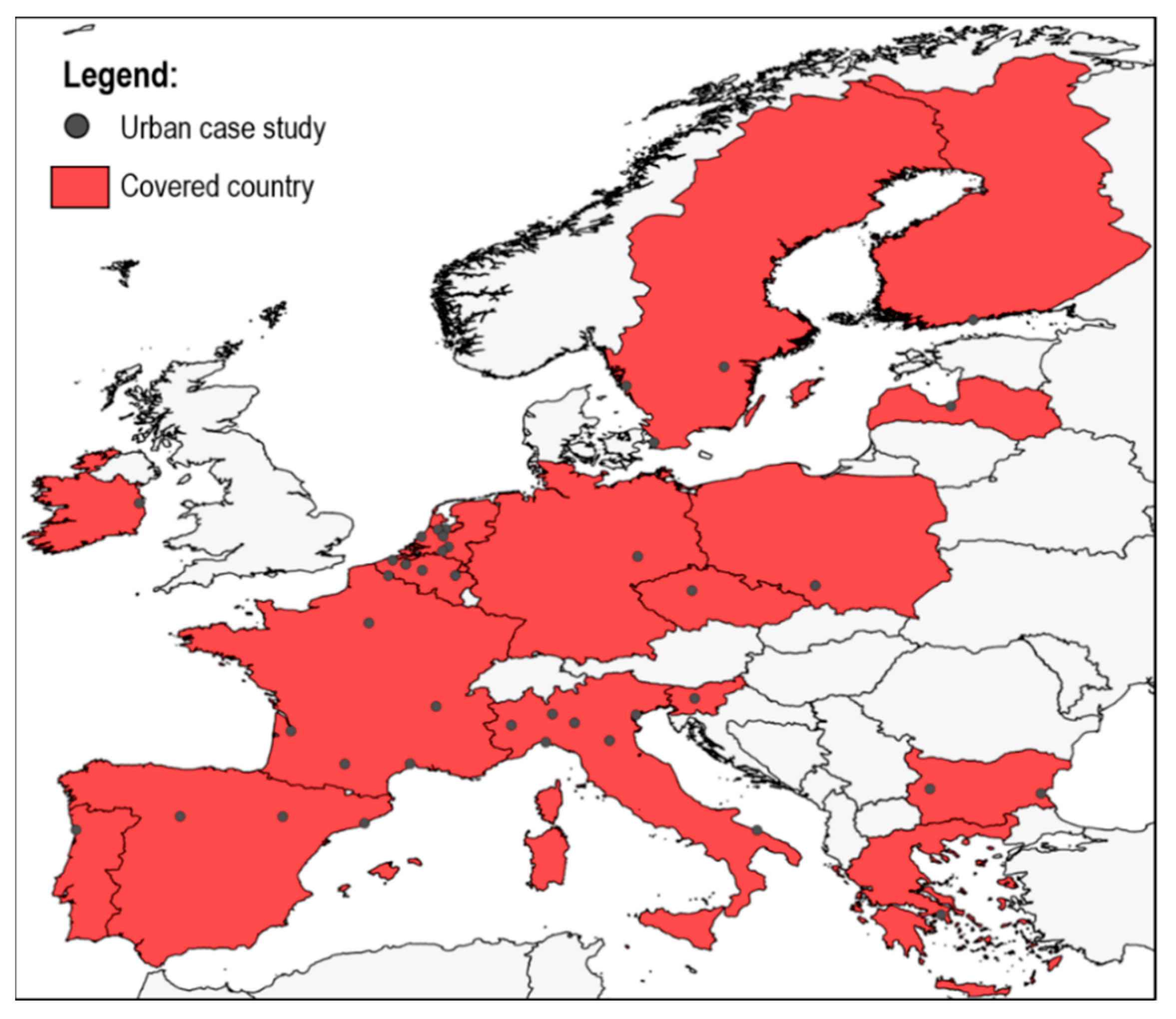
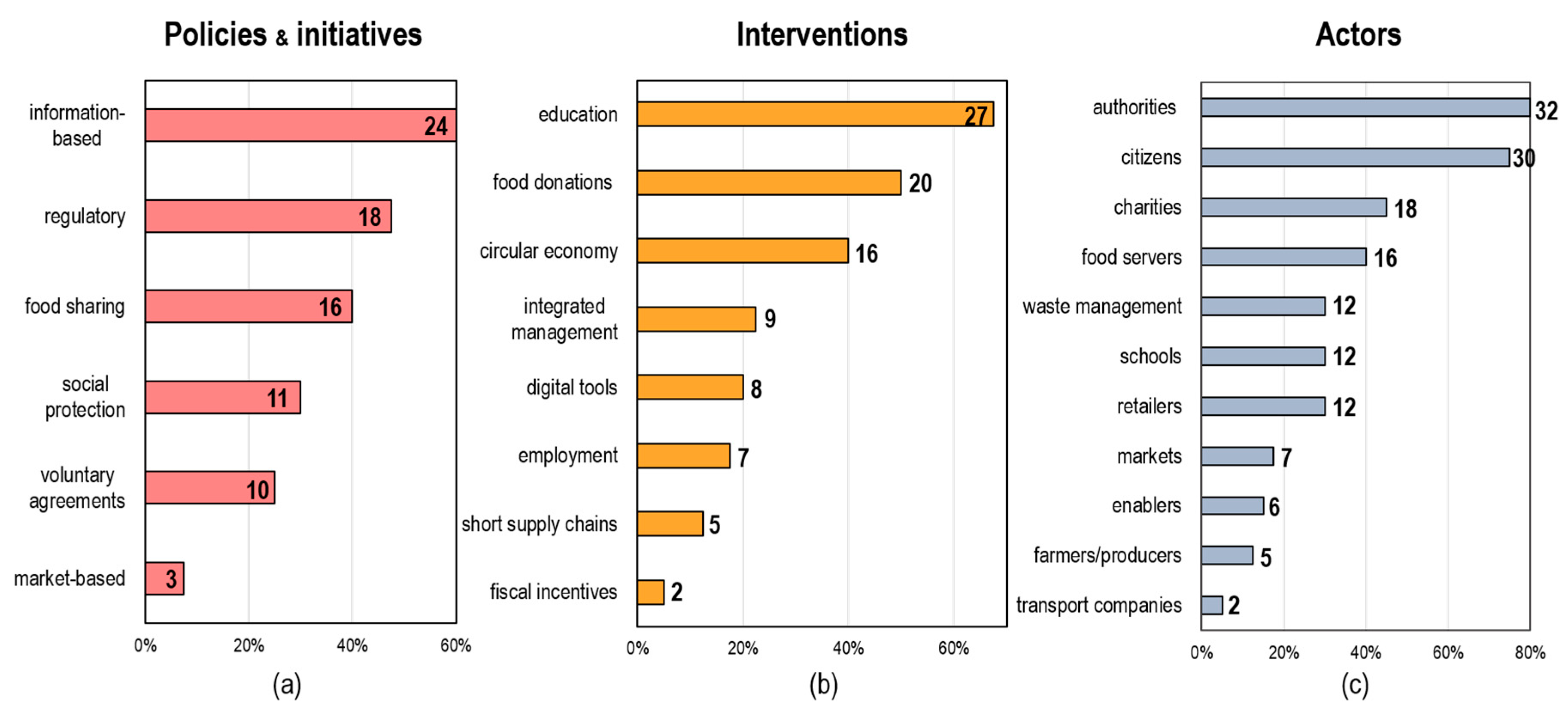
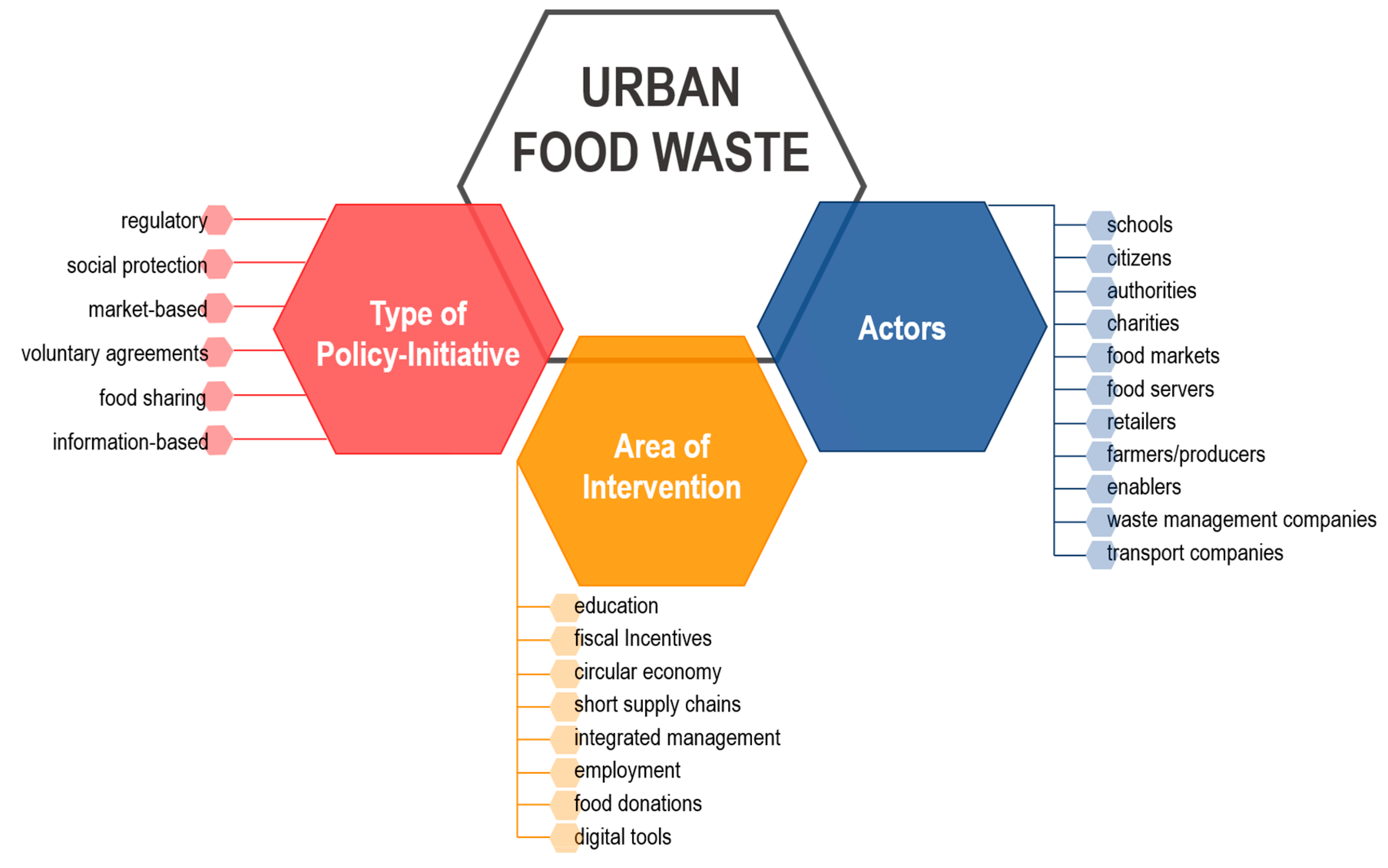
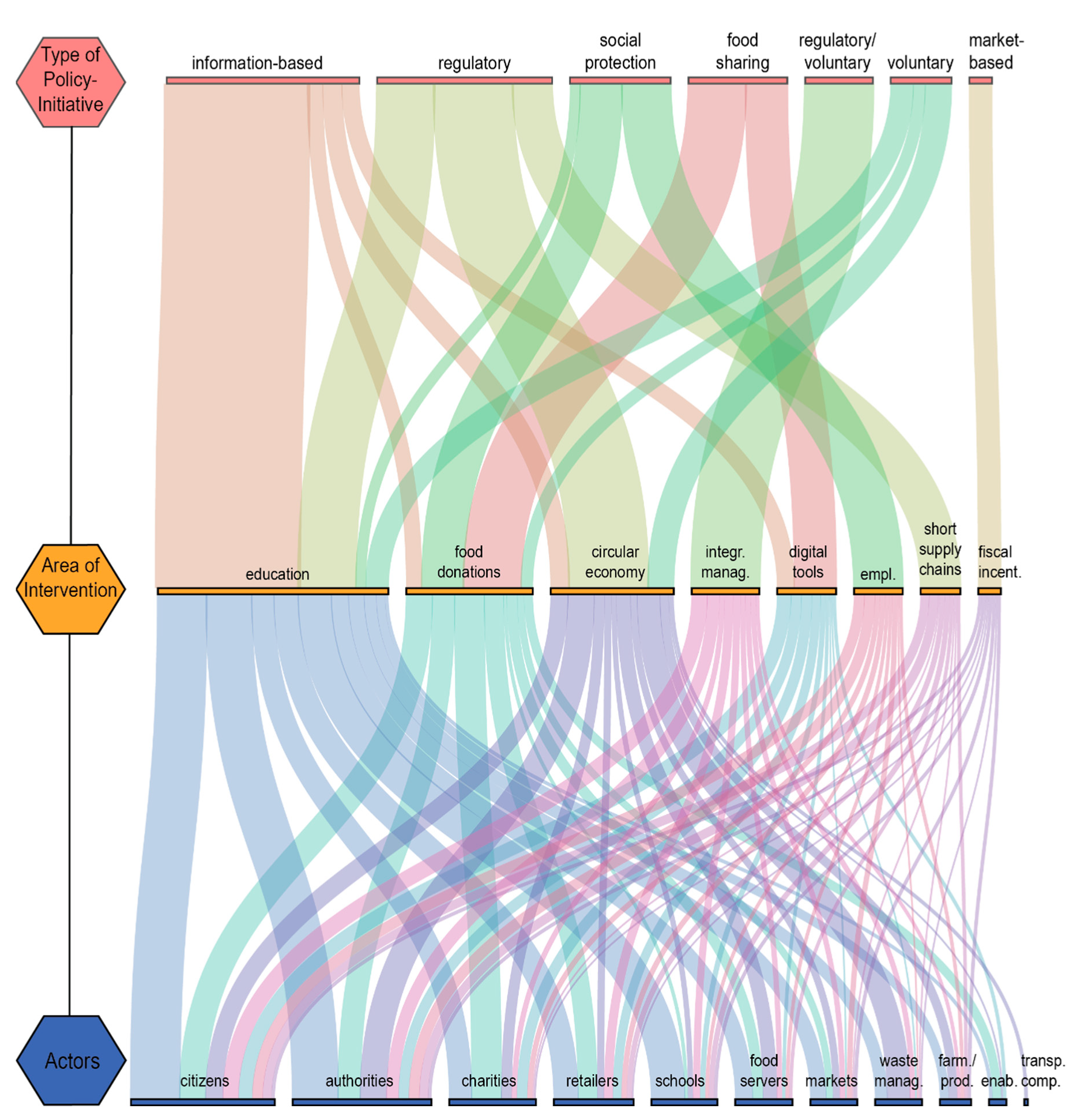
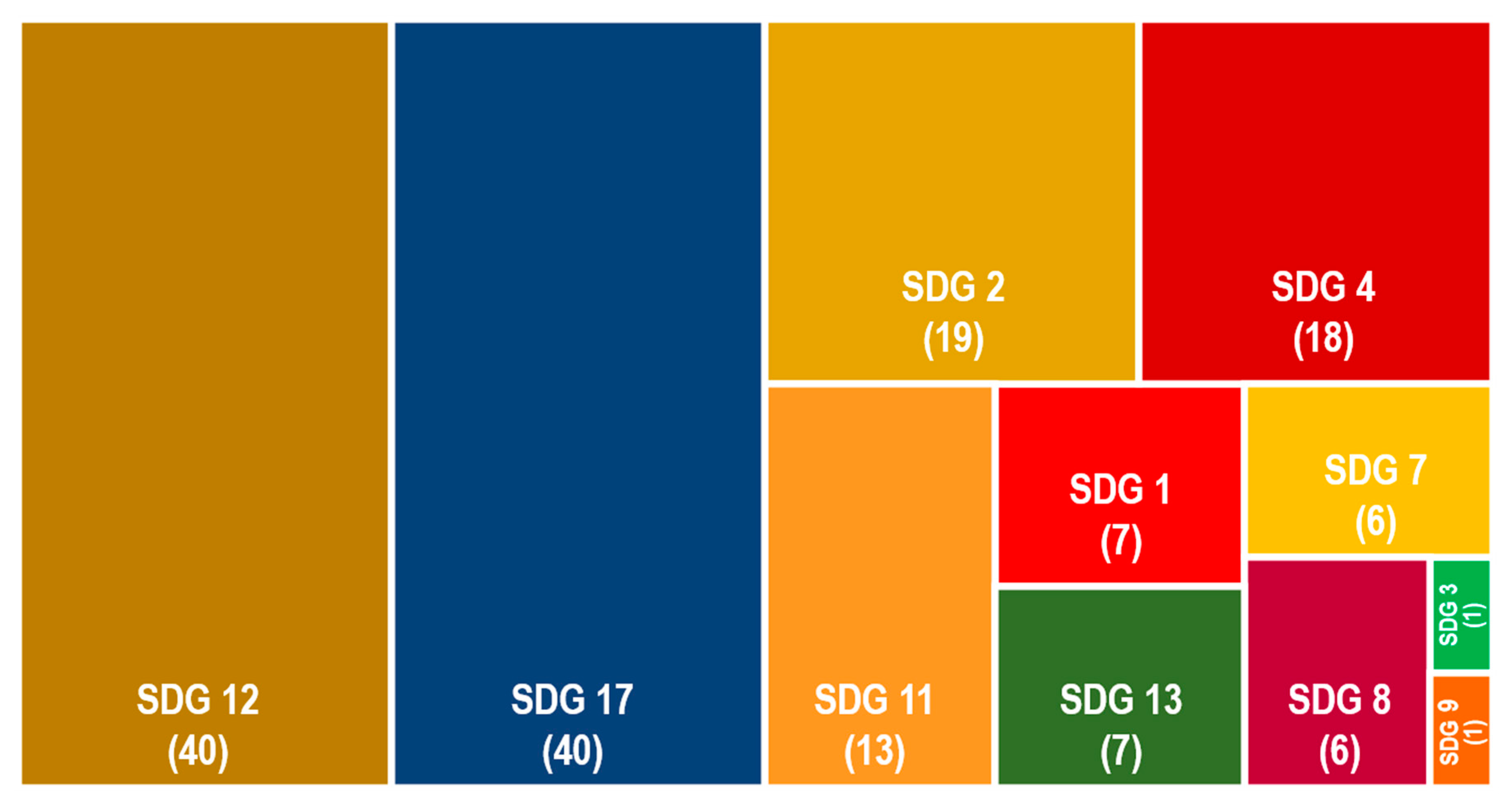
| Type of Policies and Interventions | Aims |
|---|---|
| Information Based | Raising awareness among several urban actors of the food supply chain. |
| Market Based | Reducing urban food waste through market-based instruments, including fiscal incentives and tax reductions. |
| Regulatory | Tackling food waste by means of a wide range of activities in which cities are central, such as school meals reforms, legislation to facilitate food donations or easy food safety standards, but also wide strategies, plans or regulatory documents launched at city or regional level to address food governance. |
| Voluntary Agreements | Reducing urban food waste and raising awareness through agreements signed among a wide range of actors including national and local governments, private companies, charities, NGOs, food companies. These agreements may have different levels of formality and institutionalisation, with some cities merely playing the role of facilitators. These agreements enable collaborative initiatives involving exchanges of food and/or food waste. |
| Food Sharing | Enabling food sharing operated by profit organisations (e.g., distributors, retailers, restaurants), non-profit ones and even private citizens through food donations and sharing of food through digital technologies. |
| Social Protection | Reducing food waste by empowering vulnerable citizen groups (e.g., the elderly, poorer households, long-term unemployed, migrants), through job creation as well as cultural integration measures. These policies include projects that are explicitly targeting specific groups (e.g., people in need) of the population. Therefore, they may include food donations where marginalised groups (i.e., people in need) are explicitly identified as the main beneficiaries. |
© 2020 by the authors. Licensee MDPI, Basel, Switzerland. This article is an open access article distributed under the terms and conditions of the Creative Commons Attribution (CC BY) license (http://creativecommons.org/licenses/by/4.0/).
Share and Cite
Fattibene, D.; Recanati, F.; Dembska, K.; Antonelli, M. Urban Food Waste: A Framework to Analyse Policies and Initiatives. Resources 2020, 9, 99. https://doi.org/10.3390/resources9090099
Fattibene D, Recanati F, Dembska K, Antonelli M. Urban Food Waste: A Framework to Analyse Policies and Initiatives. Resources. 2020; 9(9):99. https://doi.org/10.3390/resources9090099
Chicago/Turabian StyleFattibene, Daniele, Francesca Recanati, Katarzyna Dembska, and Marta Antonelli. 2020. "Urban Food Waste: A Framework to Analyse Policies and Initiatives" Resources 9, no. 9: 99. https://doi.org/10.3390/resources9090099
APA StyleFattibene, D., Recanati, F., Dembska, K., & Antonelli, M. (2020). Urban Food Waste: A Framework to Analyse Policies and Initiatives. Resources, 9(9), 99. https://doi.org/10.3390/resources9090099






